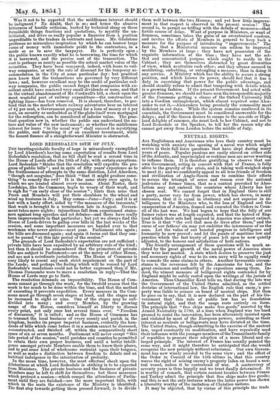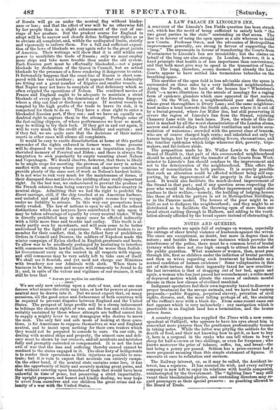NEUTRAL RIGHTS.
ALL Englishmen and Americans who love their country must be watching with anxiety the opening of a naval war which might revive in their full force questions that have slept during many years of peace. Popular passions are easily stirred on either side of the Atlantic, and unprincipled or reckless men are never wanting to inflame them. It is therefore gratifying to observe that our own Government, acting in concert with that of France, is fully alive to the gravity of the crisis, and is taking well-weighed steps to meet it ; and we confidently appeal to all true friends of freedom and civilization of Anglo-Saxon race to combine their efforts to secure the triumph of sense and reason over the national jealousies of former times, that so a contest provoked by Abso- lutism may not embroil the countries where Liberty has her chosen seat. We cannot forget that in England there is still a party, never very far from power, which has shown, in many instances, that it is equal in obstinacy and not superior in in- telligence to the Ministers who, to the loss of England and the exasperation of America, framed and executed the Orders in Coun- cil of the last war. We had begun to hope that the folly of our former rulers was at length expiated, and that the hatred of Eng- land which their acts had inspired in America was almost extinct. True is it that " the evil that men do lives after them," and the curse of our fathers' sin may yet embitter the intercourse of us the sons. Let the value of our boasted progress in intelligence and humanity be now proved ; and let the points of maritime law and practice which the last treaty of peace left open be now quietly adjusted, to the honour and satisfaction of both nations.
The friendly arrangement of these questions will be much as- sisted by the great growth of the naval power of America since they were last mooted. A state which desires to preserve the just and necessary rights of war to its own navy will be equally ready to concede the same claims to others. Another favourable circum- stance is the reverence felt by the Americans for law, and the great eminence and authority of its expositors among them. In- deed, the utmost measure of belligerent rights contended for by England might be safely rested upon the writings of the jurists of America. Thus Chancellor Kent tells us, that during the late war the Government of the United States admitted, as the settled doctrine of international law, the English rule that enemy's pro- perty was liable to seizure on board of neutral ships. But then he goes on to say, that it is now declared on the part of his Go- vernment that this rule of public law has no foundation in natural right, and that the usage rests entirely on force. The principle that " free ships make free goods," asserted by the Armed Neutrality, in 1780, at a time when England was too hard pressed to resist the innovation, has been alternately insisted upon and violated by most of the European powers, according as their interest as neutrals or belligerents may have dictated at the time. The United States, though submitting to the exercise of the ancient law, urged constantly its modification, and have repeatedly used their influence with the younger members of the Transatlantic family of republics to procure their adoption of a more liberal and en- larged principle. The interest of France has usually pointed the same way, and it might therefore be anticipated that she would recognize the new principle without reluctance. Our own Govern- ment has now wisely acceded to the same view ; and the effect of the Order in Council of the 15th ultimo is, that this country waves the right of seizing enemy's property laden on board a neu- tral vessel, unless it be contraband of war. A controversy of seventy years is thus happily and we trust finally determined. It is worthy of remark, that certain ancient treaties between France and Turkey admit the principle that free ships make free goods; and this is not the only instance where the latter power has shown a liberality worthy of the imitation of Christian nations.
It may be objected, that by virtue of this principle the trade of Russia will go on under the neutral flag without hinder- ance or loss ; and that the effect of war will be no otherwise felt by her people than in a slight enhancement of the cost of car- riage of her produce. But the prudent course for England to adopt will be to narrow and clearly define belligerent rights so as to obviate all complaint, and, within the undisputed limits, strictly and vigorously to enforce them. For a full and sufficient exposi- tion of the laws of blockade we may again refer to the great jurists of America. Their writings will show that it is still within our power to annihilate the trade of Russia ; only we must employ more ships and take more trouble than under the old system. Each Russian port must be effectually blockaded,—not a paper blockade by declaration of the Queen in Council, but an actual blockade by the presence of a force rendering it dangerous to enter. It fortunately happens that the coast-line of Russia is short com- pared with her vast territory ; and it appears that our Admiralty are fitting out a great number of frigates and smaller vessels, so that Napier may not have to complain of that deficiency which so often crippled the operations of Nelson. The combined navies of France and England ought to be adequate to maintain a strict blockade of every place in the dominions of the Russian Emperor where a ship can load or discharge a cargo. If neutral vessels be tempted by the high profits of the trade to brave its risk, it is competent for them to do so. They have a clear right to enter a blockaded Russian port, if they can ; and we have an equally un- doubted right to capture them in the attempt. Perhaps some of the fast-sailing clippers, of whose performances we hear so much, may be willing to try their luck. If they get in and out again, it will be very much to the credit of the builder and captain ; and if they fail, we are quite sure that the decisions of their native courts in other cases will silence all complaints.
It would be easy to excite dissatisfaction at home at this partial surrender of the rights enforced in former wars. Some persons will be disposed to resist the measure as an imputation upon the cherished memory of Percival and Eldon ; and there is always the temptation to seek popularity by empty vaunting about Nelson and Copenhagen. We would observe, however, that there is likely to be ample scope for asserting the prowess of our navy in actual conflict with an enemy whose position and character combine to provide plenty of the same sort of work as Nelson's hardest battle. It is not wise to risk very much for the maintenance of forms, if their disregard does not involve the yielding of any really important right. In the last war, we endeavoured to prevent the produce of the French colonies from being conveyed to the mother-country in neutral ships. Admitting that we had the right to prohibit the direct carriage, still, if the ship touched at an American harbour, and nnladed and paid duty there, she might resume her voyage under no liability to seizure. In this way our precautions were easily evaded. The law of nations is open to all; and the refined distinctions which our lawyers have contributed to spin upon it may be taken advantage of equally by every neutral trader. What is directly prohibited may in many cases be effected indirectly with a little more time and trouble and outlay. This truth is al- ready partly seen by merchants, and will soon come to be better understood by the light of experience. We exhort traders to re- member for their comfort, that, in the fullest fury of prohibitory Orders in Council and Decrees, the soldiers of Napoleon made the winter campaign of Eylan clothed in English greatcoats and boots. To allow war to be needlessly prolonged by hesitating to interfere with commerce within lawful limits, would be worse than foolish : let Government carry on the contest in all respects with vigour, and still commerce may be very safely left to take care of itself. We shall see it flourish, and yet need not charge our Ministers with treachery nor our Admirals with sloth. When there is business to be done, men and means will commonly be found to do it; and, in spite of the valour and vigilance of our cruisers, it will still be true that
" Atmum per medics ire satellites . . amat."
We are only now entering upon a state of war, and no one can j foresee what course the strife may take, or how far powers at present neutral may be drawn into it. But we must expect that, on many occasions, all the good sense and forbearance of both countries will be required to prevent disputes between England and the United States. The prospect of large profits will be a strong inducement to infringe the clearest rights of war, and the loss and violence in- evitably sustained by those whose attempts are baffled cannot fail to supply a mighty lever to any demagogue who desires to move the mob. The only fair and safe mode of looking at these ques- tions, is for Americans to suppose themselves at war and England neutral, and to insist upon nothing for their own traders which they. would not be prepared to concede to ours. On our side, in dealing with neutral ships and property, the utmost care and deli- cacy must be shown by our cruisers, and all accidents and mistakes fully and promptly corrected or compensated. It is not the least evil of war that the loss and suffering thereby caused cannot be confined to the states engaged in it. The clear duty of belligerents is to render their operations as little injurious as possible to neu- trals; but it is vain to expect that neutrals can entirely escape. On the other hand, if the neutral state sustains some loss, it has also the opportunity of fairly and securely making great gains, and that without entering upon branches of trade that would have been unlawful in time of peace, but preserving a strict impartiality. By upright purposes, and honest and kindly dealing, we may hope to avert from ourselves and our children the great crime and ca- lamity of a war with the United States.



























 Previous page
Previous page